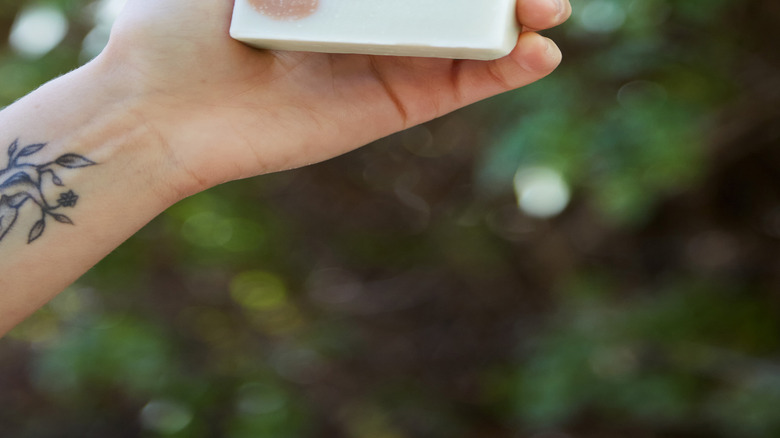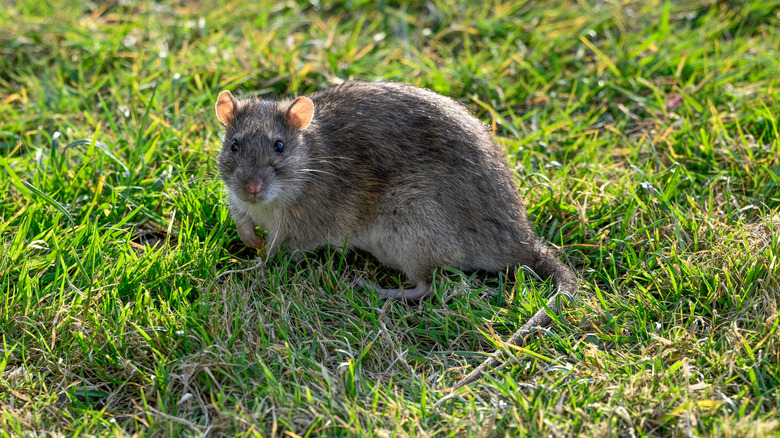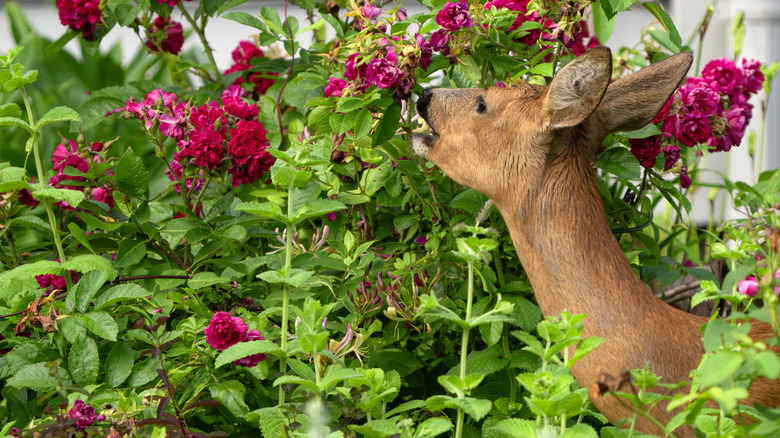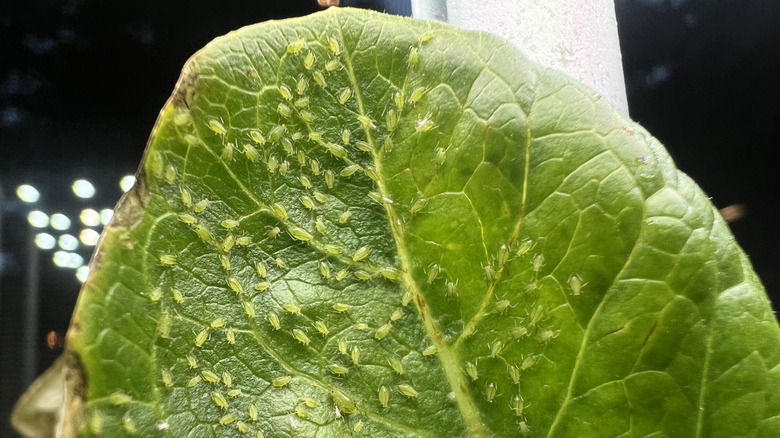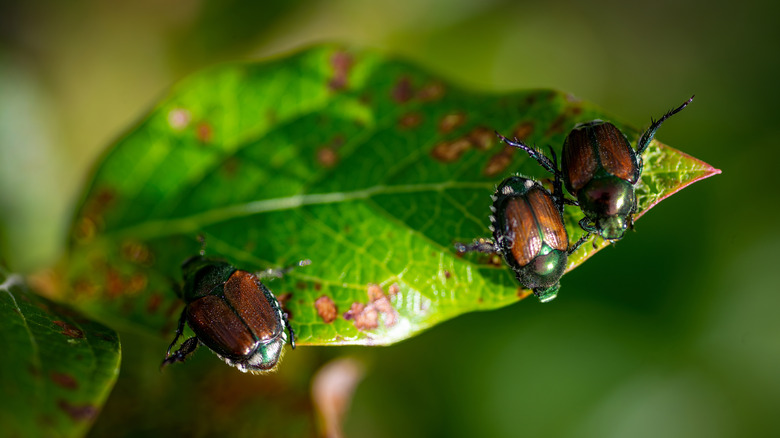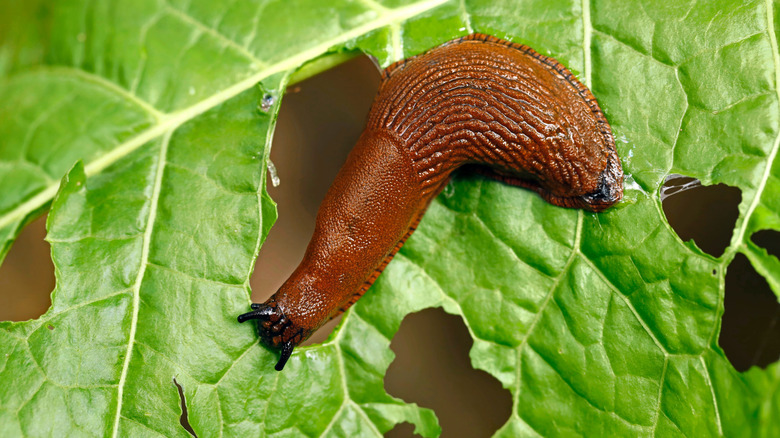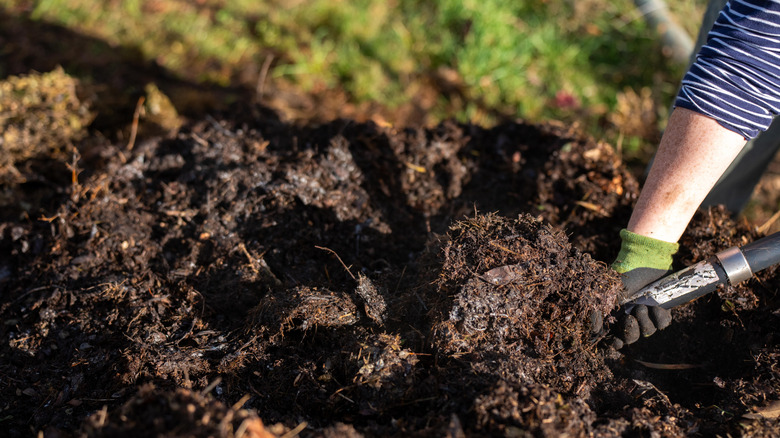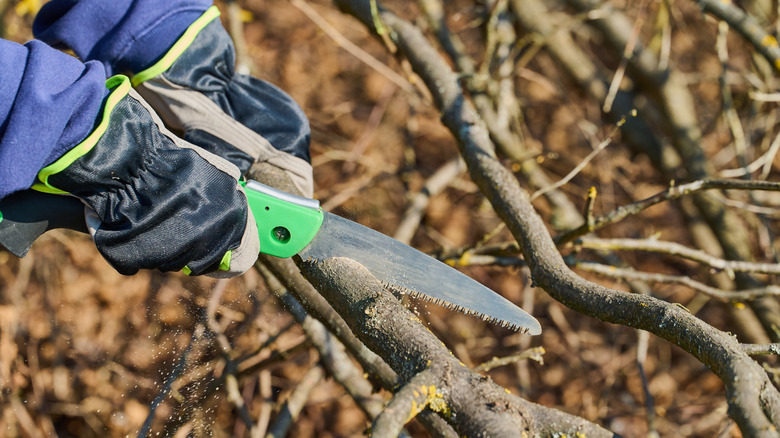7 Amazing Ways To Start Using Bar Soap In Your Garden
When it comes to gardening work, having soap on hand is paramount. A bar of soap outdoors offers a way to help you clean up dirty messes on hands and clothing, particularly after working with plants or your lawn. It can also be vital for quick clean-ups for hand gardening tools and patio furniture, too. This can be as simple as leaving a bar of soap in a shed or garage so you can quickly use it with an outdoor sink or bucket of water without having to go inside with dirty hands.
Cleaning your hands, clothing, and gardening items can seem like some of the more obvious ways you should have a bar of soap handy. Yet it turns out there are other less common uses for bars of soap some people have thought of as well. Such uses may extend beyond gardening tools to your actual garden, including ways you can possibly protect plants from pests. As you get started with all the ways you might potentially use bar soap in your garden, it's also important to take steps to protect your plants to reduce the risk of soap-related injuries.
Use as a possible deterrent for rodents on your property
A 2025 study published in Science Advances noted that the rat population is rising in urban areas due to warming temperatures and human population growth, with the authors advising for cities to implement more comprehensive management strategies. Rodents like rats aren't just city-specific issues, though. Whether your home is located in an urban or more rural area, chances are you will have to deal with rodent issues at some point, including within your garden. If you're looking for chemical-free deterrents, a bar of soap might offer one such opportunity. Strong-scented soaps such as Irish Spring might help deter rodents because they purportedly are turned off by the odor. This works similarly to other DIY methods, such as the way people may try to keep mice out of the kitchen with a little-known cinnamon hack.
For this soap hack, you simply grate or cut a whole bar of Irish Spring soap into small pieces and place them around the exterior of your home. If you're wanting to try this bar soap strategy against rodents, know that it's largely based on anecdotal reports. You can try this bar soap technique without doing any harm, but also keep in mind that it may only work temporarily against rodents. It's even possible that squirrels, mice, and rats who are regularly exposed to the soap might adapt to the scent over time. To maintain the rodent-repelling effects, be sure to clean the pieces of soap and replace them occasionally, such as after it rains.
Help protect your plants from deer
Brand-name Irish Spring soap may potentially deter other wildlife, too. In this case, deer are the fascinating reason people put bar soap in their garden. The way Irish Spring purportedly works against deer is similar to rodents in that the animals may avoid areas with the soap become they don't care for the musky smell. Such methods might be especially helpful if you can't get deer to stop eating hostas or other plants in your garden.
To use Irish Soap or another strong-scented product for deer, simply place multiple bars of soap around your garden while concentrating on areas near plants that these animals are known to eat. You can consider tying a bar of soap on the ends of branches every 3 feet for the best protection. To maintain deer-deterring results, you will need to hang new bars of soap after it rains to maintain the effects of Irish Spring. As with any other pests, you might consider this bar soap hack as an additional layer of protection that's best combined with other deer management strategies.
May help control bugs in your garden
You might be hearing fellow gardeners increasingly relying on soap solutions for garden pests over chemical versions, and for good reason. Not only are such methods arguably safer and more affordable for the humans that apply them, these may possibly be effective against common plant pests, such as spider mites and aphids. In fact, Colorado State University Extension notes that soap solutions have been used for garden pest control for over 200 years! The exact mechanisms are not fully understood, but researchers believe soap might disrupt protective cell membranes in insects.
A bug problem in your garden is yet another opportunity to use a bar of soap, especially if you're wanting to get rid of aphids and other small, but damaging, pests. Before you get started, make sure you dilute the soap to a 2% concentration to reduce the risk of injuring your plants. You might also consider rinsing the solution off with clean water after each soapy water application. (As a bonus, you might even find that a spray of clean water from your garden hose may remove some aphids, too!) Some gardeners have reported success with budget-friendly castile or ivory soaps, but the big key here is to make sure the bar soap is always unscented. Never use undiluted soap or dish detergent on plants, and consider testing a small area of a plant at least a day ahead of widespread use in your garden to see if any injuries develop.
Can come in handy for hand-picking certain pests from plants
While some bugs on your plants may be sprayed with diluted soapy water, this strategy may not work against all pests. Such is the case with beetles and slugs. These types of pests can quickly cause widespread damage to your plants, so it's important to utilize methods that actually work. To that end, most experts recommend hand-picking these types of bugs from your plants. This isn't the most pleasant task, but it's the most direct method that will also do no harm to your plants. Having a bucket full of soapy water on hand helps to dispose of the pests without further hassle, as they will more easily drown in a soap and water mixture than in just water on its own. Who knows — this could end up becoming your preferred method of organic pest control in the garden.
To use this method, simply place a new bar of soap in a bucket and fill it with water. Have the soapy water nearby as you hand-pick certain pests from your plants. You can also shake the affected plant over the bucket for removing beetles in the early morning hours when infestations might peak. Keep in mind that this strategy works best on smaller plants on your garden, and not so much on larger shrubs and trees.
Coconut oil soap may help deter snails and slugs
Aside from hand-picking certain pests and placing them in buckets of soapy water, it's possible that a bar of soap might help deter them from your plants altogether. Such is the case with snails and slugs. While the exact science isn't understood, it's thought that bar soaps made with coconut oil might be off-putting to these pests. There are even some commercial repellents made with coconut oil soap that are designed for such purposes, but you can use bar soap with coconut oil as well.
Trying this bar soap method is relatively straightforward. All you need to do is to carefully cut the soap and fix it into a ring shape that will fit around the base of each plant. The goal here is to literally stop slugs and snails in their tracks with this scented barrier. If all goes well, these pests will take a whiff of the coconut scent and then steer clear of the area.
Certain bar soaps may prevent mildew in compost
Once you've learned how to compost, you might experience its long list of benefits including reduced waste, water conservation, improved soil health, and many more. One common issue you might come across in your compost bin is mildew buildup. While it's important to keep your compost moist so it doesn't dry out and affect the decomposition process, too much moisture can create mildew problems. It's important to try to find this happy balance, but you might also need to address this fungal growth before it spreads and compromises your compost. To that end, some people choose to add certain bars of soaps to their compost to help prevent mildew.
Before you add bar soap to your compost, it's important to know that only certain types are safe. Never add soaps with fats, artificial dyes, fragrances, or chemical additives, as these may compromise the health of your compost pile. Instead, choose natural oil-based soap, such as castile and ivory-based versions. If you're unsure of what's in a bar of soap, look for key phrases such as "biodegradable," as this indicates it's unlikely to be laden with synthetic materials or chemicals. Another benefit of adding bar soap to your compost is that the method offers a way to help use bits of the product that are too small to use and would otherwise be thrown away in the trash. You can expect soap to take several months to decompose in your compost.
May help keep gardening tools sharp
You might already use bar soap to help clean your garden tools properly by removing dirt and debris on a regular basis. Bar soap might have yet another use for these tools to help keep them in top condition. In fact, bar soap may help keep certain gardening tools sharp. This strategy helps address dull blades so they can work more efficiently against thick vegetation. Handsaws, shovels, and hoes can all benefit from lubricating with bar soap. You might find that your tools work almost like new again, and thereby reduce the need for buying commercial gel lubricants.
To use this method, simply take a fresh bar of soap and carefully rub the product against the edges of the blades on your gardening tools. Always wear protective gloves. You can do this before each use, or whenever you notice the blades are no longer gliding like they should. As a caveat, you'll want to avoid using this hack on shears and other pruning tools, as the undiluted residue may harm your plants.
